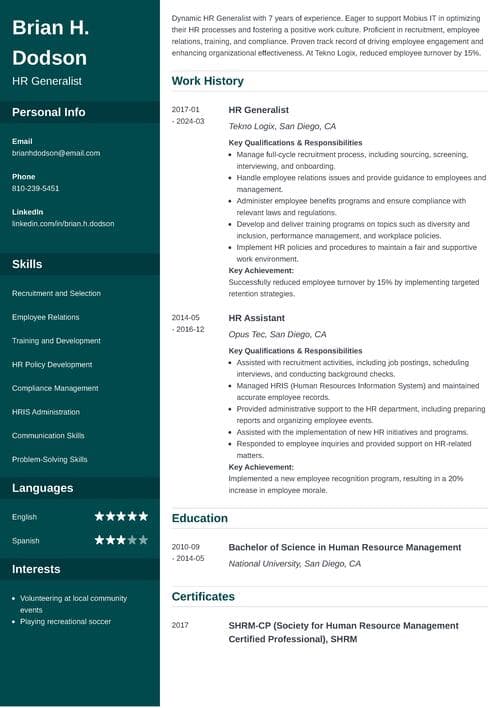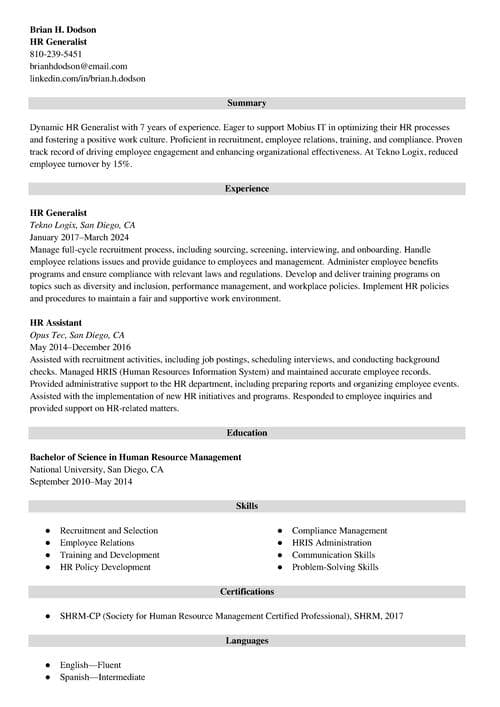HR skills are vital for professional growth. Whether you're a seasoned HR professional or just starting out, honing your human resources skills can elevate your effectiveness in the workplace and boost your career development. Read on to discover our list of top HR skills, find out how to improve these skills, and how to highlight them on a resume.
This guide will show you:
- What are HR skills?
- A list of the best HR skills for resumes.
- How to improve your HR skills and competencies.
- How to showcase your human resources skills on a resume.
Want to save time and have your resume ready in 5 minutes? Try our resume builder. It’s fast and easy to use. Plus, you’ll get ready-made content to add with one click. See 20+ resume templates and create your resume here.
Sample resume made with our builder—See more resume examples here.
Check out other articles about the HR industry:
- HR Resume Examples & Writing Guide
- Entry-Level Human Resources Resume: Sample & Writing Guide
- Human Resources Cover Letter Samples & Writing Guide
- HR Manager Sample & Writing Guide
- HR Statistics
What Are HR Skills?
HR skills are essential abilities for managing people-related tasks in the workplace. They include talent acquisition, employee relations, and performance management, among others. Human resources skills are critical for fostering a positive work environment and driving organizational success.
Employers value HR skills because they contribute to employee engagement, productivity, and retention. Proficiency in human resources skills allows professionals to attract top talent, cultivate strong relationships with employees, and implement strategies for ongoing growth and development. In summary, mastering HR skills is crucial for creating a thriving workplace culture and achieving business objectives.
Read more: How to Decide Which Skills Should Go On Your Resume
Human Resources Skills Examples
Human Resources (HR) professionals are pivotal in shaping organizational culture, managing employee relations, and driving strategic initiatives. A diverse HR skill set is essential for HR professionals to effectively address the complex challenges of the modern workplace. Here are thirteen key HR skills and how they contribute to effective human resources management:
1. Talent Acquisition
Talent acquisition is more than just filling open positions; it's about strategically identifying and attracting top talent to drive organizational success. HR professionals skilled in talent acquisition possess the ability to develop comprehensive recruitment strategies tailored to the needs of the organization.
Actions HR professionals can take to demonstrate their talent acquisition skills:
- Develop comprehensive job descriptions and compelling job postings to attract qualified candidates.
- Utilize various recruitment channels, including job boards, social media, and professional networks.
- Conduct structured interviews and assessments to evaluate candidate skills, experience, and cultural fit.
- Collaborate closely with hiring managers to understand staffing needs and align recruitment efforts with organizational goals.
2. Employee Relations
Employee relations lie at the heart of creating a positive work environment where employees feel valued, respected, and empowered. HR professionals skilled in employee relations serve as trusted advisors to both employees and management, fostering open communication and resolving conflicts with fairness, empathy, and other interpersonal skills.
Nurturing employee relations increases employee morale, engagement, and retention rates. Knowing how to boost employee engagement rates is a priceless HR skill, as 59% of workers globally are not engaged, aka quiet quitting.
Actions HR professionals can take to demonstrate their employee relations skills:
- Proactively address workplace conflicts and grievances to maintain a harmonious work environment.
- Provide guidance and support to employees and managers on HR policies, procedures, and best practices.
- Conduct investigations into employee complaints or misconduct allegations with fairness, confidentiality, and impartiality.
- Implement strategies to enhance employee engagement, satisfaction, and retention.
3. Training and Development
Investing in employee training and development is essential for building a skilled and engaged workforce capable of driving organizational growth and innovation. In fact, 61% of employees in the U.S. declare that upskilling opportunities are an important factor that would make them stay longer at a particular job.
HR professionals skilled in training and development design and deliver customized learning programs that align with the organization's goals and employee development needs.
Actions HR professionals can take to demonstrate their training and development skills:
- Conduct training needs assessments to identify skill gaps and development opportunities within the organization.
- Design and deliver engaging training programs and workshops tailored to the needs of different employee groups.
- Evaluate the effectiveness of training initiatives through feedback, assessments, and performance metrics.
- Develop career development plans and succession strategies to support employee growth and retention.
4. Performance Management
Effective performance management is essential for aligning individual and organizational goals, providing feedback, and driving employee engagement and productivity. HR professionals skilled in performance management design and implement performance appraisal systems that provide meaningful feedback and recognition to employees.
Actions HR professionals can take to demonstrate their performance management skills:
- Establish SMART (Specific, Measurable, Achievable, Relevant, Time-bound) performance goals aligned with organizational objectives.
- Conduct regular performance reviews and provide constructive feedback to employees on their strengths and areas for improvement.
- Implement performance improvement plans (PIPs) or disciplinary actions when necessary, following established HR policies and procedures.
- Recognize and reward high performers through formal recognition programs, bonuses, or promotions.
5. Compensation and Benefits Administration
Competitive compensation and benefits packages are essential for attracting, retaining, and motivating top talent. HR professionals skilled in compensation and benefits administration design and administer comprehensive total rewards programs that align with the organization's compensation philosophy and budgetary constraints.
Actions HR professionals can take to demonstrate their compensation and benefit administration skills:
- Conduct comprehensive market research and salary surveys to ensure competitive compensation structures.
- Administer employee benefits programs, including health insurance, retirement plans, and flexible spending accounts.
- Process payroll accurately and timely, adhering to federal, state, and local regulations and tax requirements.
- Educate employees on their total rewards package and assist them with benefits enrollment and inquiries.
6. HR Technology
Technology plays a critical role in streamlining HR processes, enhancing data-driven decision-making, and improving the employee experience. Professionals with technological HR skills leverage digital tools and platforms to automate routine tasks, streamline workflows, and provide self-service options for employees.
Actions HR professionals can take to demonstrate their HR technology skills:
- Implement and manage Human Resources Information Systems (HRIS) for data management, reporting, and analytics.
- Utilize Applicant Tracking Systems (ATS) to streamline recruitment processes, track candidate progress, and manage talent pipelines.
- Leverage Learning Management Systems (LMS) to deliver online training and development programs.
- Explore emerging HR technologies such as artificial intelligence (AI) and machine learning to enhance HR decision-making and automation.
7. Strategic Planning
Strategic planning involves aligning HR initiatives with organizational goals and objectives to drive business success. HR professionals skilled in strategic planning collaborate with senior leadership to develop strategies supporting the organization's mission, vision, and values.
Actions HR professionals can take to demonstrate their strategic planning skills:
- Partner with senior leadership to develop HR strategies that support business objectives and organizational culture.
- Conduct environmental scans and SWOT (Strengths, Weaknesses, Opportunities, Threats) analyses to identify HR trends and challenges.
- Develop workforce planning models to anticipate future talent needs and skill requirements.
- Monitor key performance indicators (KPIs) and metrics to evaluate the effectiveness of HR programs and initiatives.
8. Change Management
Change management involves facilitating smooth transitions during organizational changes and transformations. HR professionals skilled in change management help employees navigate uncertainty, build resilience, and embrace new ways of working.
Actions HR professionals can take to demonstrate their change management skills:
- Communicate change initiatives effectively to employees, stakeholders, and other key audiences.
- Identify potential barriers to change and develop strategies to mitigate resistance and overcome challenges.
- Provide coaching and support to employees and managers to help them navigate change and transition successfully.
- Evaluate the impact of change initiatives and make adjustments as needed to ensure alignment with organizational goals and objectives.
9. Diversity and Inclusion Management
Diversity and inclusion management involves creating a culture of belonging where all employees feel valued, respected, and empowered to contribute their unique perspectives. HR professionals skilled in diversity and inclusion management develop and implement initiatives, programs, and policies that promote equity, fairness, and inclusion.
Actions HR professionals can take to demonstrate their diversity and inclusion management skills:
- Develop and implement diversity and inclusion initiatives, programs, and policies that promote equity and fairness.
- Conduct diversity training and awareness programs to educate employees on the importance of diversity, inclusion, and cultural competence.
- Implement recruitment strategies to attract diverse talent and reduce bias in the hiring process.
- Monitor diversity metrics and track progress toward diversity and inclusion goals and objectives.
10. Conflict Resolution
Conflict resolution involves addressing and resolving interpersonal conflicts and disputes in a constructive and collaborative manner. HR professionals skilled in conflict resolution facilitate open communication, empathy, and problem-solving to resolve conflicts and build stronger relationships.
Actions HR professionals can take to demonstrate their conflict resolution skills:
- Mediate disputes and disagreements between employees, managers, and other stakeholders to find mutually acceptable solutions.
- Facilitate open and honest communication to clarify misunderstandings and uncover underlying issues.
- Implement conflict resolution techniques and strategies, such as active listening, empathy, and problem-solving, to promote understanding and reconciliation.
- Provide coaching and training to employees and managers on conflict resolution skills and techniques.
11. Labor Relations
Labor relations focus on managing relationships between employers and labor unions or employee representative organizations. HR professionals skilled in labor relations interpret and administer collective bargaining agreements, represent management in labor negotiations, and ensure compliance with labor laws and regulations.
Actions HR professionals can take to demonstrate their labor relations skills:
- Interpret and administer collective bargaining agreements (CBAs) and labor contracts.
- Represent management in labor negotiations, grievance procedures, and arbitration hearings.
- Ensure compliance with labor laws, regulations, and reporting requirements related to unionized workforces.
- Foster positive labor-management relationships through effective communication, collaboration skills, and conflict resolution.
12. HR Compliance and Legal Knowledge
HR compliance and legal knowledge involve understanding and adhering to federal, state, and local laws, regulations, and employment and labor practices requirements. HR professionals skilled in compliance and legal knowledge ensure HR policies, practices, and procedures comply with applicable laws and regulations.
Actions HR professionals can take to demonstrate their HR compliance skills and legal knowledge:
- Ensure HR policies, procedures, and practices comply with applicable laws and regulations, such as Title VII, FLSA, ADA, and FMLA.
- Conduct audits and assessments to identify areas of non-compliance and implement corrective actions and preventive measures.
- Provide guidance and counsel to management and employees on HR-related legal issues, such as discrimination, harassment, and wrongful termination.
- Collaborate with legal counsel and external consultants to address complex legal matters and mitigate legal risks and liabilities.
13. Workplace Safety and Risk Management
Workplace safety and risk management involve identifying, assessing, and mitigating risks and hazards to create a safe and healthy work environment. HR professionals skilled in workplace safety and risk management develop and implement safety policies, procedures, and programs to prevent accidents, injuries, and illnesses.
Actions HR professionals can take to demonstrate their workplace safety and risk management skills:
- Develop and implement safety policies, procedures, and programs to prevent accidents, injuries, and illnesses.
- Conduct workplace inspections and assessments to identify potential safety hazards and compliance issues.
- Provide safety training and education to employees on proper safety practices, procedures, and emergency protocols.
- Investigate workplace accidents, incidents, and near misses to determine root causes and implement corrective actions and preventive measures.
Read more: If you need more information about which skills to put on your resume, read our guide: Everything You Need to Know About Skills on Your Resume
How to Improve Your HR Skills?
Enhancing your HR skills is crucial for advancing your career and making a positive impact in your organization. Here are some tips to help you develop and refine your HR skills:
1. Take Advantage of Professional Development Opportunities
Participate in workshops, webinars, and conferences to stay updated on industry trends and best practices. Seek out opportunities for mentorship and coaching to gain insights from seasoned HR professionals.
2. Build Your Network
Networking with peers, industry experts, and thought leaders can provide valuable insights and perspectives. Join professional associations, online forums, and LinkedIn groups to connect with other HR professionals and share knowledge and experiences.
3. Seek Feedback and Self-Reflection
Solicit feedback from colleagues, managers, and mentors to identify areas for improvement and growth. Reflect on your experiences, successes, and challenges to gain insights into your strengths and development opportunities.
4. Embrace Lifelong Learning
Stay curious and open to learning new skills and concepts. Invest in continuous learning through online courses, books, podcasts, and other educational resources to broaden your knowledge and expertise. For starters, you can check out online courses such as:
- Human Resources Analytics from Coursera
- World-Class HR: 21st Century Talent Management from Udemy
- Diversity and Inclusion for HR Professionals from Coursera
- Unconscious Bias: Fuel Diversity and Become a Better You from Udemy
- HR Hot Topic: Pay Equity from HRCI
- Challenging inappropriate behavior in the workplace from Coursera
- Awkward at the Office—Supervisor Edition (All States) from Udemy
Pro Tip: Don't hesitate to step out of your comfort zone and take on new challenges. Embrace opportunities for growth and development, even if they seem daunting at first. Each experience will help you expand your skill set and advance your career in HR.
How to List HR Skills on a Resume
It’s not only about picking the best skills for an HR resume. It’s also about how you showcase your HR skills effectively on your resume, as this can help you stand out to potential employers.
Here’s how to list HR skills on a resume:
- Use action verbs and quantifiable achievements to describe your HR accomplishments.
- Tailor your resume to each job application, emphasizing the HR skills most relevant to the position.
- Include a separate resume skills section listing your key HR competencies
Pro Tip: Consider obtaining professional certifications, such as SHRM-CP, PHR, or HRBP, to validate your HR skills and enhance your credibility as an HR professional.
Plus, a great cover letter that matches your resume will give you an advantage over other candidates. You can write it in our cover letter builder here. Here's what it may look like:
See more cover letter templates and start writing.
Take proactive steps to enhance your HR skills, and remember to showcase them effectively on your resume to attract potential employers. Invest in your development, and you'll be well-positioned to thrive in your HR career.
About Zety’s Editorial Process
This article has been reviewed by our editorial team to make sure it follows Zety's editorial guidelines. We’re committed to sharing our expertise and giving you trustworthy career advice tailored to your needs. High-quality content is what brings over 40 million readers to our site every year. But we don't stop there. Our team conducts original research to understand the job market better, and we pride ourselves on being quoted by top universities and prime media outlets from around the world.




